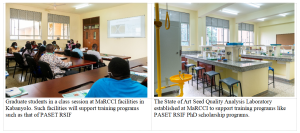Makerere University Regional Centre of Excellence for Crop Improvement has been identified as a premium centre to train quality PhDs in Plant Breeding and Biotechnology and will now be known as an “African Host Centre (AHU/C).
MaRCCI, in collaboration with the Department of Agricultural Production (DAP) based at the College of Agricultural and Environmental Sciences (CAES, is charged with training quality PhD students from across Africa to address the human resource gap of highly qualified specialists in the fields of Plant Breeding and Biotechnology. The first cohort of Ten (10) scholars from Benin, Kenya, Mozambique, Nigeria, South Sudan and hosts Uganda have already commenced their study programs with RSIF funding (Table 1). Later this year (2024), another group of 4 PhDs from Nigeria and Rwanda will join as cohort 2. This program expects to enroll at least 10 PhDs every year at Makerere University for the foreseeable future with full funding. RSIF PhD Scholarships are open to African nationals interested in receiving international-quality PhD training. The overall goal of PASET RSIF is to train 10,000 PhDs for Africa in STEM.

ABOUT PASET -RSIF
The Partnership for skills in Applied Sciences, Engineering and Technology (PASET) is an African-led initiative with the goal of strengthening skills in the Applied Sciences, Engineering and Technology to further socio-economic transformation in sub-Saharan Africa (SSA). The Regional Scholarship and Innovation Fund (RSIF) is the flagship program of PASET. RSIF focuses on transformative technologies that have a far-reaching positive impact on society. It is funded
by contributions from African governments, the World Bank and the Government of Korea and facilitated by the International Centre of Insect Physiology and Ecology (ICIPE) in Nairobi, Kenya. RSIF aims to train quality PhD students and post-doctoral researchers to address the human resource gap of highly qualified specialists in the fields of applied sciences, engineering, and technology (ASET) and to contribute to improving research and innovation capacities in those fields in SSA. RSIF also supports the strengthening of research and innovation ecosystems at selected African Host Universities (AHU) by providing funding through competitive grants. RSIF supports training, research, and innovation in five Priority
Thematic Areas
- ICT including big data and artificial intelligence.
- Food security and agri-business
- Minerals, mining and materials engineering,
- Energy including renewables and
- Climate change.
The specific objectives of RSIF are to:
- Create a stock of highly skilled scientists, professionals, and innovators in ASET areas.
- Identify and nurture young talented Africans who wish to further their studies in ASET fields where expertise is needed most.
- Address imbalances in the number of women and disadvantaged groups in ASET fields in Africa.
- Build African university capacity to provide relevant ASET training and to ensure continued investment in scaling up ASET education and workforce.
Application process:
- Applicants apply for a scholarship to conduct PhD research in the PASET Priority Thematic Area.
- Applicants apply to the ICIPE online portal indicating their preference for a PhD program at approved AHUs (a current list of RSIF AHUs and PhD programs is available here).
- The AHU and RSIF selection panels will review applications and make recommendations to the PASET for scholarship awards.
On the award of RSIF Scholarships, awardees must immediately complete registration to the selected RSIF AHU
Duration of the PhD Scholarship: The scholarship is for 3 to 4 years, including 6-24 months in a ‘sandwich’ training placement at an international partner university, research institute or private company. Priority for the scholarships will be given to women and existing young academic faculty who do not have a PhDs.
